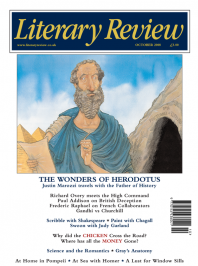Jonathan Mirsky
Sore Feet, Heavenly Eyes
China Witness: Voices from a Silent Generation
By Xinran (Translated by Esther Tyldesley, Nicky Harman and Julia Lovell)
Chatto & Windus 435pp £20
I have never reviewed three books by the same author for Literary Review until now. In 2002 I wrote of Xinran’s first book, The Good Women of China, which was based on her interviews during a call-in radio programme she conducted in China, that it was the most eloquent account of the lives of Chinese women I had ever read. Two years later I found her second book, Sky Burial, disappointing; it was based on a two-day interview with a Chinese woman who recalled in minute detail events in Tibet decades earlier – and then vanished. So, after two other books I haven't read, how is Xinran doing?
Very well. This is another excellent book, and is more ambitious than the first because Xinran had actively to set up the dozen or so interviews within it. The women in the first book, after all, had called Xinran's station and could speak anonymously if they wanted. Interviewees in China

Sign Up to our newsletter
Receive free articles, highlights from the archive, news, details of prizes, and much more.@Lit_Review
Follow Literary Review on Twitter
Twitter Feed
Johannes Gutenberg cut corners at every turn when putting together his bible. How, then, did his creation achieve such renown?
@JosephHone_ investigates.
Joseph Hone - Start the Presses!
Joseph Hone: Start the Presses! - Johannes Gutenberg: A Biography in Books by Eric Marshall White
literaryreview.co.uk
Convinced of her own brilliance, Gertrude Stein wished to be ‘as popular as Gilbert and Sullivan’ and laboured tirelessly to ensure that her celebrity would outlive her.
@sophieolive examines the real Stein.
Sophie Oliver - The Once & Future Genius
Sophie Oliver: The Once & Future Genius - Gertrude Stein: An Afterlife by Francesca Wade
literaryreview.co.uk
Princess Diana was adored and scorned, idolised, canonised and chastised.
Why, asks @NshShulman, was everyone mad about Diana?
Find out in the May issue of Literary Review, out now.
Literary Review - For People Who Devour Books
In the Current Issue: Nicola Shulman on Princess Diana * Sophie Oliver on Gertrude Stein * Costica Bradatan on P...
literaryreview.co.uk